EXODUS
Main Finding
Our Findings
This study made some rather surprising, and some not so surprising findings. Since the creation of Nigeria, there has always been the urge for some of its citizens to travel abroad other than as tourists. Going for higher education or, “for further studies” used to be the one principal reason for doing so. While most of those who left with this reason came back home, many did not. The lure of better life in their host countries became too strong for them to wish to go back home. The first set of diasporas was made up of this group.
As the economic, political and security situation in Nigeria deteriorated, those who would never have considered leaving started to do so. Going for further studies soon became a main reason for going abroad. The percentage of those who willingly came back home dropped.
Today, for most Nigerians, leaving the country for further studies is largely not an option. The economic situation is dire, and the strength of the Nigerian currency is tragically low – less than 1% of what it was 20 years ago. This makes going for further studies an option only available to the children of the very wealthy elite class.
We had dropped going for further studies as a reason for leaving because of the potential noise and distortion that this introduces into the findings of this research. (Refer to the Methodology).
Set out below are highlights of the findings of the study.
Age groups of would-be emigrants
1 in 4 of those who would like to leave Nigeria are aged between 20 and 30 years, with another 1 in 4 between 30 and 40. Effectively, 50% of would-be emigrants are within the most active population of between 20 and 40 years. Another 19% is accounted for by people aged between 40 and 50.
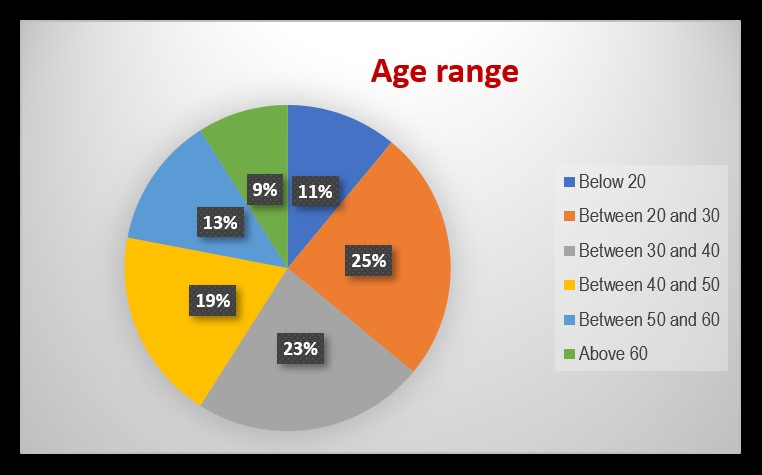
Their genders.....
Nearly 2 out of every 3 would-be emigrant are males. One third of them are females. (There is a third group with 7% made up of those who are either non-binary, or did not wish to express their gender.) In terms of geographical spread, this breakdown appears to be reversed for several northern states where most of those expressing desire to leave are females. There appears to be a correlation between this and religion as a reason for wanting to leave.
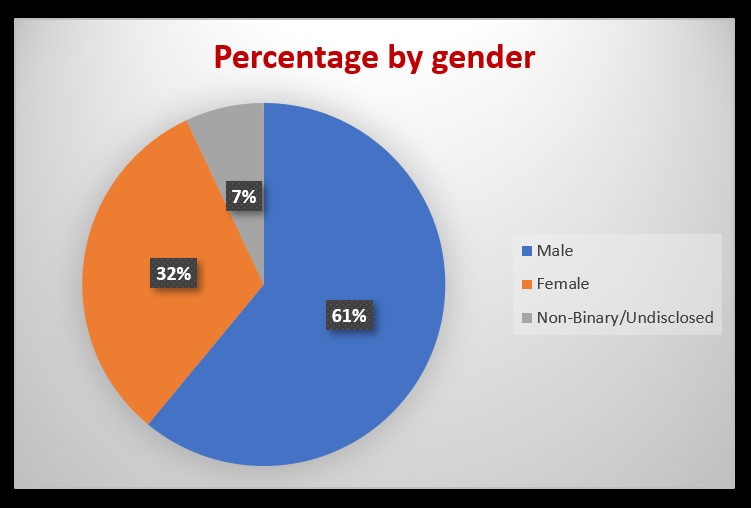
Crossing their age and gender
In addition to the findings of north-south differences in incidence of gender, there appears to also be differences between the age groups. For would-be migrants aged above 60, there is a 24 percentage points difference in favour of women wanting to leave.
The category “Others” as the reasons for wanting to leave is evoked more within this group than in any other.
The percentage of women gradually increased from 31% for the age group 30-40 to 63% for the over-60s.
The incidence of non-binary gender is highest for the 30-50 year-olds.
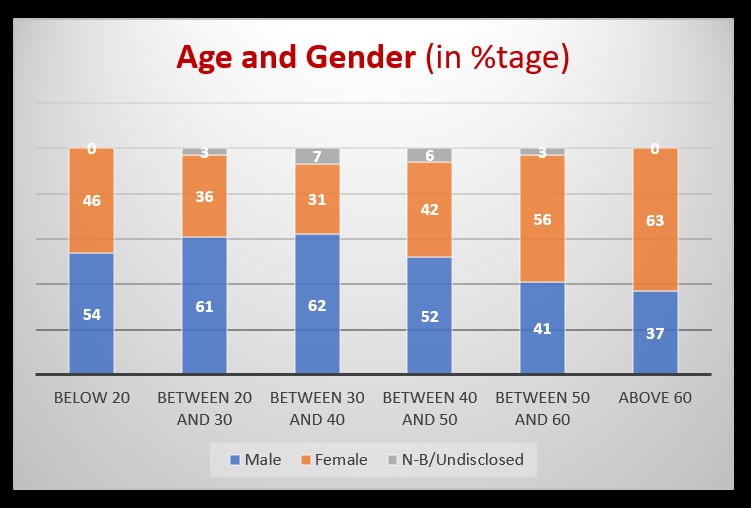
Their states of origin.....
With nearly 8 out of 10 expressing a desire to do so, Ogun State leads the table of those wishing to leave the country if they were given the chance. This is closely followed by Edo State.
The two states with the least interest in leaving the country are Yobe and Taraba with 6 and 7 out of 100 respectively.
In general, while most states in the south show above 40% of people expressing interest to leave, most of the northern states fall below 15%. In the middle belt, Plateau and Benue States are outliers with 44% and 47% respectively. What is perhaps worth noting is that in most of the northern states, women outnumber the men wishing to leave the country by a ratio of 3 to 1. The reverse is the case in the Southern states.
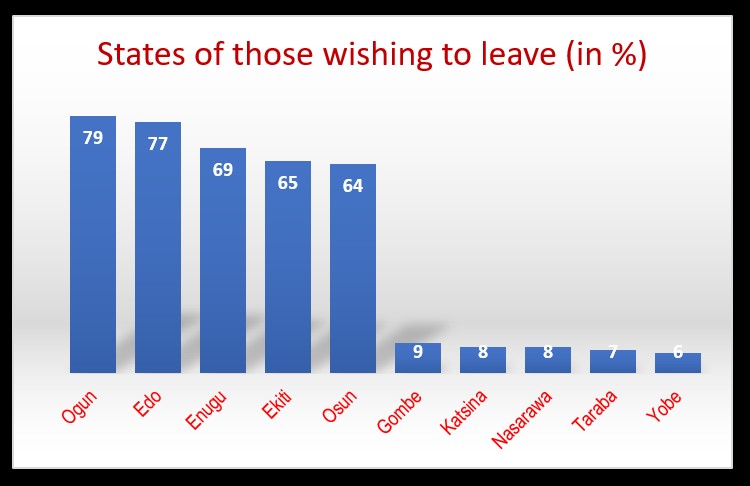
Their levels of education
79% of those who indicated a doctorate degree as their highest level of education would like to leave the country. This is against 33% among those who expressed basic education certificate as their highest attainment. Two thirds of those with first university degree or the equivalent would like to leave the country. Caution is advised in the use of Educational Qualification as an indicator because going for further studies as reason for wishing to leave was removed as an option. This appeared to impact on those with lower educational backgrounds.
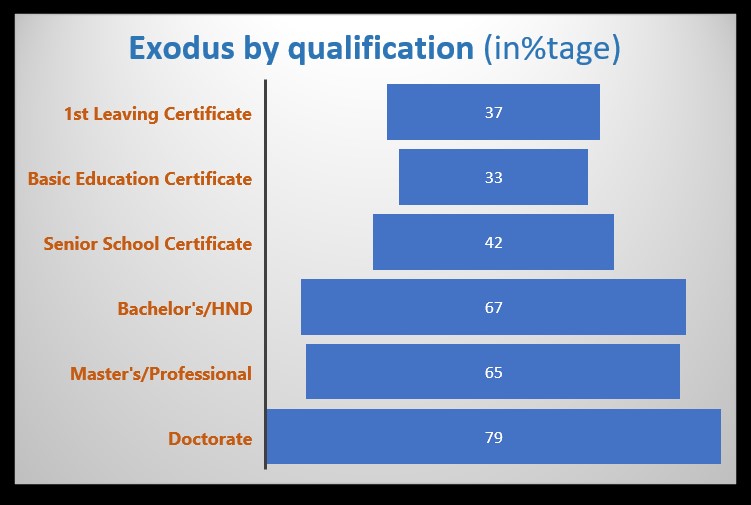
Their professions.....
One surprising finding of the EXODUS study was the fact that nearly 8 out of every 10 people within the medical profession would like to leave the country. This is closely followed by the academics for who the figure is 7 out of ten. Those in politics and governance are the least interested in leaving at 9%, closely followed by legal professionals at 11%. There are no notable differences along gender divide as regards the various professionals. Nevertheless, interest in leaving among those in politics and governance in several northern states is very negligible.
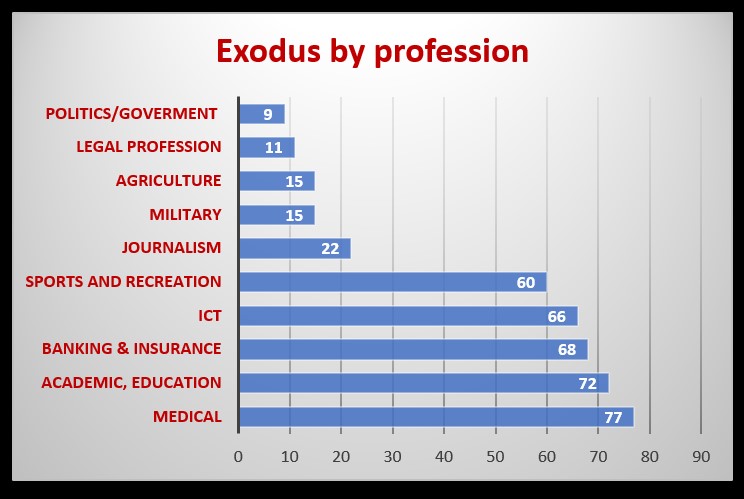
Reasons for wanting to leave.....
For 4 out of 10 of the respondents, economic and financial reasons are why they would like to leave. 2 out of 10 cite security reasons while another one out of 10 would leave for a combination of the two reasons. Effectively, 71% of the respondents would leave for either one or both of the reasons. Political insecurity was another key issue evoked.
Religious intolerance was the least ranked of the reasons.
Security concern was evoked more by respondents from the northern states than the south. Economic and financial reasons were evenly spread across the states.
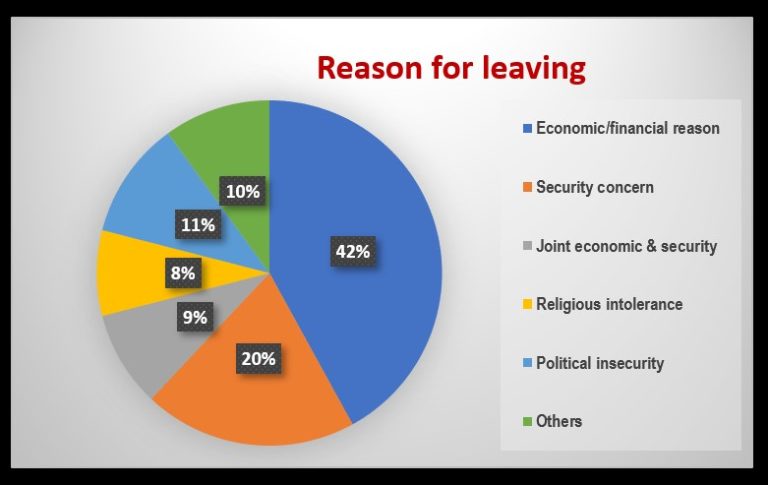
Reasons by age.....
To enable a clearer view of the relative importance of the 3 key reasons within the various groups, in analysing the Reason by age we isolated the Joint economic and security as well as the Political insecurity elements. isolate.
The result is that the Economic and financial reasons peaked at 62% for the 20-40 year-olds, gradually falling to 22% for the over 60 year-olds. In the same breadth, inversely, Security concern becomes an issue with age. It gradually increases from 19% for the 20-30 year-olds to 51% for the over-60s.
Political insecurity was a major concern for people above 40 years. An average of 1 out of 5 would consider leaving for this reason.
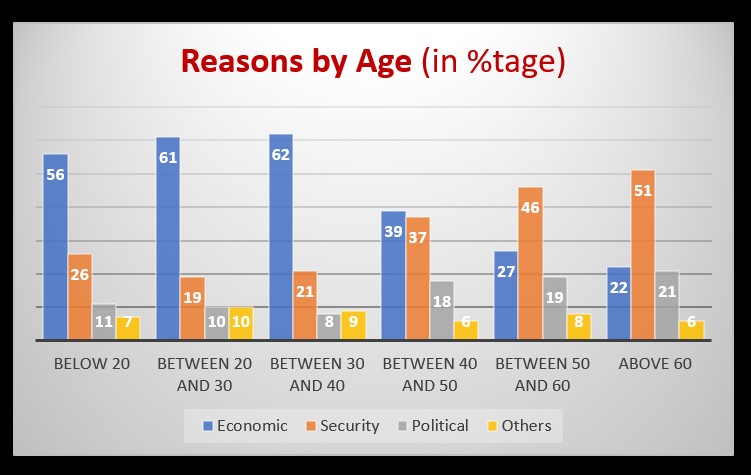
Where they want to go.....
Accounting for nearly 4 out of every 10, the UK is by far the destination of choice for those wishing to leave. This is followed by the United States with 22% and Canada with 10%. Considering the language constraint, France with 9% comes (as a surprise) in the fourth position. Together, these four countries would be the choice for 8 out of 10 would-be emigrants. Interestingly, 68% of those in the medical profession opting to go chose the UK as their preferred destination.
More than half (52%) of those with doctorate degree expressed interest in going to Canada.
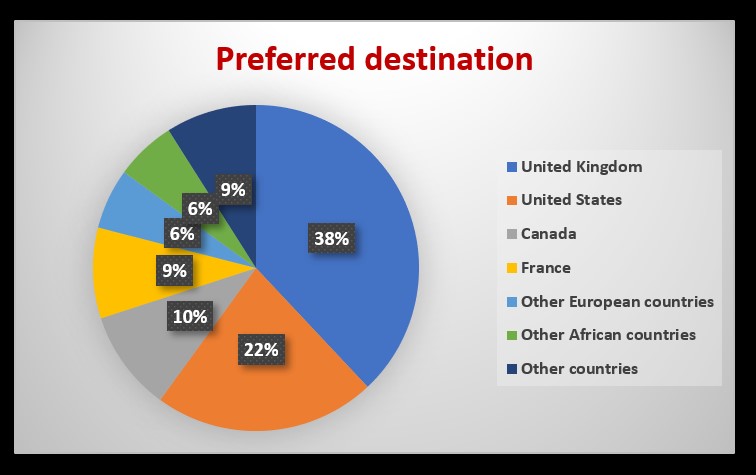
Acknowledgement
This project would not have been possible without the support of several individuals and groups that contributed to it in one form or another. Any success achieved would mostly be a credit to the willing and insightful inputs of the individual respondents to the survey. The project has been fortunate to benefit from the expertise of two social statisticians, Dr Dupe Eromonsele and Dr Magdalena Walkowska who conceptualised and also acted as advisers to it. We are grateful to those who support ORG, without whose material and financial inputs, this project would not have been made possible.
